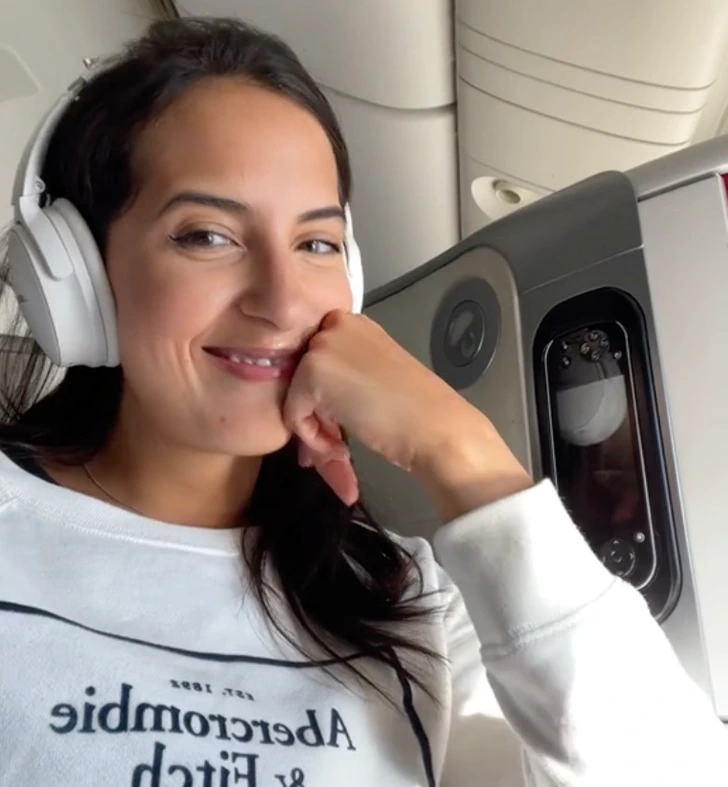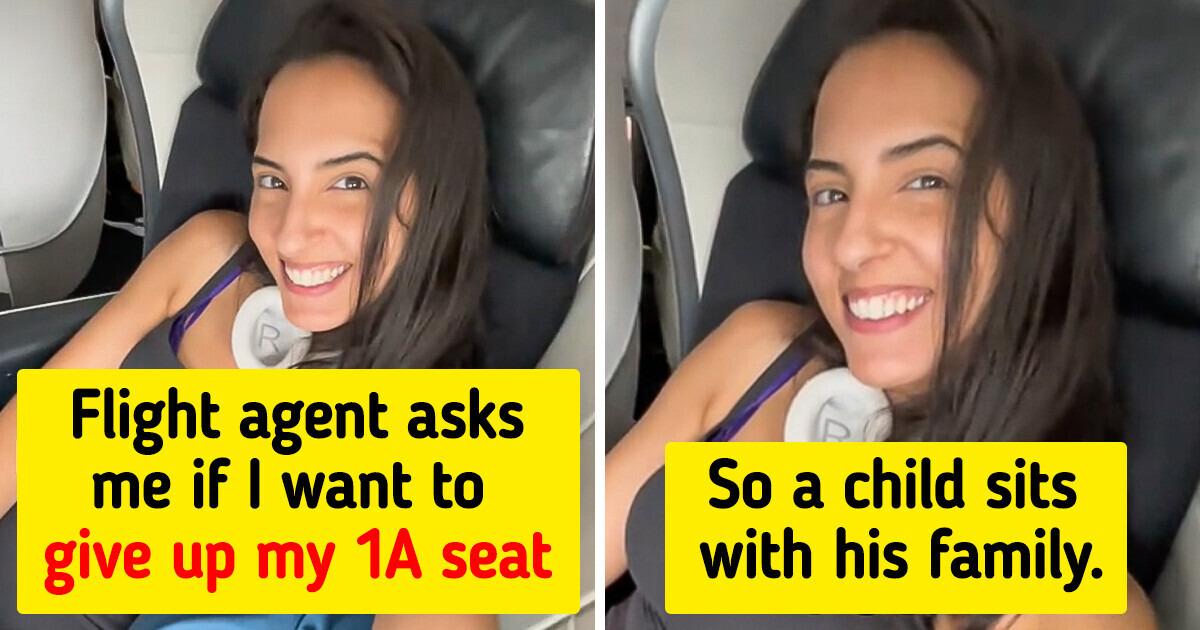In today’s hyperconnected world, where even the smallest moments can snowball into viral phenomena, one woman’s experience on a routine flight became the catalyst for a heated online debate. The incident unfolded when the passenger, comfortably seated in her first-class spot, was asked to swap seats with a child, sparking a conversation that delved into themes of entitlement, empathy, and societal expectations.
A Viral Moment: How a TikTok Video Ignited a Social Media Storm
It all began when the woman, whom we’ll refer to as Sarah, shared a short TikTok video that captured a lighthearted exchange between her and a flight attendant. In the clip, the attendant suggested she switch her first-class seat, 1A, to accommodate a child who wanted to sit with their family. Sarah humorously documented her polite refusal, explaining that while she declined, an alternative solution was quickly arranged, ensuring that all passengers were content.
Yet, what Sarah intended as a brief, playful moment soon escalated beyond her control. Her video rapidly garnered millions of views, likes, and a flurry of comments, splitting social media into two camps. While some viewers praised her for standing her ground, others criticized her actions as lacking empathy. As the debate spread, it became clear that this seemingly minor incident touched on broader themes that resonated with many people, each bringing their own perspectives and experiences into the conversation.

The Incident Unfolds: Choosing Personal Comfort Over a Seat Swap
The moment that sparked the controversy took place when a flight attendant approached Sarah and asked if she would be willing to switch her seat so that a child could sit next to their family. Sarah, who had planned and paid for her first-class seat, opted to stay where she was and requested the attendant check the seating map for other possible options. Her choice, while well within her rights, soon became the subject of widespread debate.
Supporters of Sarah’s decision argued that she was under no obligation to sacrifice her comfort, especially after taking the necessary steps to secure a specific seat. For many, it was a matter of principle: the child’s family should have organized their seating arrangements in advance if they wished to sit together. Several users even shared personal anecdotes of traveling with children, emphasizing that planning ahead is key and that relying on the generosity of strangers is not always a feasible backup plan. In this light, Sarah’s stance was seen as a reasonable assertion of her right to enjoy the journey she had prepared for.

The Call for Empathy: Understanding the Family’s Point of View
On the other side of the debate were those who empathized with the child’s family, seeing Sarah’s decision as a missed opportunity to show kindness and understanding. For them, the scenario represented more than just a seating issue; it was about the unpredictability of travel and the need for passengers to sometimes accommodate one another. Unexpected situations, such as last-minute flight changes or booking errors, can lead to less-than-ideal seating arrangements, and for these passengers, the hope is that others will show empathy and help make the experience smoother, especially when children are involved.
Several commenters pointed out that flying can be stressful for families, particularly those with young children, and that a little bit of flexibility can go a long way. They argued that by refusing to move, Sarah missed a chance to make a family’s trip a little less challenging. While not everyone agreed, the underlying message from this group was clear: sometimes, showing compassion can mean setting aside one’s own comfort for the benefit of others, especially when the stakes are relatively low.
The Broader Conversation: Where Do We Draw the Line?
As Sarah’s video continued to circulate and opinions poured in from all corners of the internet, the conversation began to reflect more than just the specifics of her case. The debate expanded into discussions about personal rights, communal responsibility, and the ever-evolving etiquette of air travel. Some argued that airlines should have clearer policies or better methods for accommodating families to avoid putting passengers in awkward situations. Others felt that this issue extended beyond just planes, touching on how society navigates shared spaces and communal experiences.

The conflicting viewpoints also raised questions about privilege and expectations. Is it fair to expect those who have paid for a first-class ticket to give up their seat at a moment’s notice, even if it’s to help a family stay together? Or should there be a greater push for preemptive solutions that eliminate the need for such last-minute requests? What started as a personal decision on a flight became a microcosm of larger societal issues, with no easy answers in sight.
Voices of Reason: Navigating the Complexities of Air Travel Etiquette
Interestingly, amidst the heated discourse, there were also calls for a more nuanced approach to situations like these. Several voices emerged advocating for a balance between individual autonomy and community spirit. They acknowledged the validity of Sarah’s decision to keep her seat, emphasizing that she should not be vilified for her choice. At the same time, they encouraged people to consider the unique challenges families face when traveling, suggesting that a little empathy could make a world of difference.
Many social media users proposed that a solution might lie in how airlines handle family bookings, suggesting more proactive efforts to seat families together or provide better communication options before passengers board. Others advised that, when possible, passengers could at least be open to conversations about seat swaps, viewing it as an opportunity to show understanding rather than a burden. Ultimately, the discourse highlighted the importance of flexibility, communication, and respect for all parties involved.

Beyond the Social Media Storm: Reflecting on What We Learned
Sarah’s viral video and the ensuing discussions serve as a reminder of the complexities of modern travel, where individual actions can be scrutinized and debated on a global scale within moments. While opinions may have varied widely, the episode underscored a critical point: behind every seat swap request, every video, and every social media post are real people, each with their own reasons, stories, and perspectives.
It’s easy to make snap judgments based on a 60-second video or a single caption, but the reality is often more layered. Whether it’s about maintaining personal boundaries, showing empathy, or navigating the unpredictable nature of travel, there is room for more thoughtful, nuanced dialogue. Perhaps the broader takeaway from this incident is a need for more understanding—both online and in the real world. In a society where digital interactions can quickly devolve into arguments, striving for patience and compassion might be the key to bridging the gaps in our everyday experiences.
Sarah’s experience was a momentary glimpse into a larger conversation, one that will likely continue as air travel becomes more accessible and social media remains a dominant platform for sharing and dissecting daily life. For now, it stands as a testament to the power of small actions and how they can spark big debates, urging us all to consider the perspectives of others and to navigate shared spaces with a bit more empathy.
